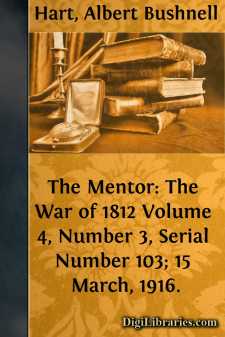Categories
- Antiques & Collectibles 13
- Architecture 36
- Art 48
- Bibles 22
- Biography & Autobiography 813
- Body, Mind & Spirit 142
- Business & Economics 28
- Children's Books 16
- Children's Fiction 13
- Computers 4
- Cooking 94
- Crafts & Hobbies 4
- Drama 346
- Education 46
- Family & Relationships 57
- Fiction 11829
- Games 19
- Gardening 17
- Health & Fitness 34
- History 1377
- House & Home 1
- Humor 147
- Juvenile Fiction 1873
- Juvenile Nonfiction 202
- Language Arts & Disciplines 88
- Law 16
- Literary Collections 686
- Literary Criticism 179
- Mathematics 13
- Medical 41
- Music 40
- Nature 179
- Non-Classifiable 1768
- Performing Arts 7
- Periodicals 1453
- Philosophy 64
- Photography 2
- Poetry 896
- Political Science 203
- Psychology 42
- Reference 154
- Religion 513
- Science 126
- Self-Help 84
- Social Science 81
- Sports & Recreation 34
- Study Aids 3
- Technology & Engineering 59
- Transportation 23
- Travel 463
- True Crime 29
The Mentor: The War of 1812 Volume 4, Number 3, Serial Number 103; 15 March, 1916.
Categories:
Description:
Excerpt
Our defeat of Great Britain in the Revolutionary War was conclusive; though "we" in that case included France, without whose aid the patriots must have been defeated. It is not so easy to discover a fund of military glory in the War of 1812.
That was a great war year. Within a few days of the declaration of war by the United States against Great Britain, Napoleon's Grand Army of over 400,000 men crossed the Niemen into Russia. Six months later 4,000 of that host recrossed, pursued by the Russians; and probably not more than 100,000 of the whole number ever saw their homes again. In 1813, while the Americans were fighting on the ocean and on Lake Erie, Napoleon was driven out of Germany. A few weeks before the Battle of Lundy's Lane, Napoleon was compelled to abdicate. Soon after the news of the Peace of Ghent with Great Britain was received in the United States, in 1815, Napoleon broke loose from Elba; and a few months later he was again a prisoner and sent to St. Helena.
———
To most of Europe the American War of 1812 seemed an unwarrantable flank attack in the great running fight of the nations. Russia and Prussia resented it that American statesmen should throw the weight of their country on the side of the great military despot of his time. They wanted none of the military and naval strength of Great Britain to be diverted across the ocean. The suggestion was even made in Congress that the United States ought to declare war at the same moment on both France and England. That idea has been carried out by Captain Marryat in his once popular novel "Midshipman Easy," where he describes a triangular duel between three sailors; but nations could hardly engage in such a game.
ANDREW JACKSONTHE ELEPHANT AND THE WHALE
Nevertheless Congress found some difficulty in selecting the enemy to fight; for the conditions were remarkably like those of the year 1915. People used to talk then about the "war between the elephant and the whale": the elephant being the land army of Napoleon, which apparently nothing could withstand, and the whale being the navy of Great Britain, which had command of the sea. That struggle reached a crisis in 1806, when the two belligerents, not being able to reach and hammer each other, did their best to hammer the neutral carrying trade, which was carried on largely in American ships.
THE SURRENDER OF GENERAL HULLBY ORDERS IN COUNCIL
Great Britain declared the whole French coast blockaded from Brest to the Elbe, just as in 1915 the same power declared the whole North Sea coast to be blockaded. By Decrees France declared the whole British Islands to be in a state of blockade, exactly as Germany recently declared those coasts to be a "naval zone." The consequence was that the French captured 600 American merchantmen in the next nine years, and the British took 900.
In this long controversy the French were the wiliest, the British were the most arrogant. The United States would have been justified in war against either of these powers, on the basis of their disregard of our right to keep up neutral trade with both belligerents.
...


